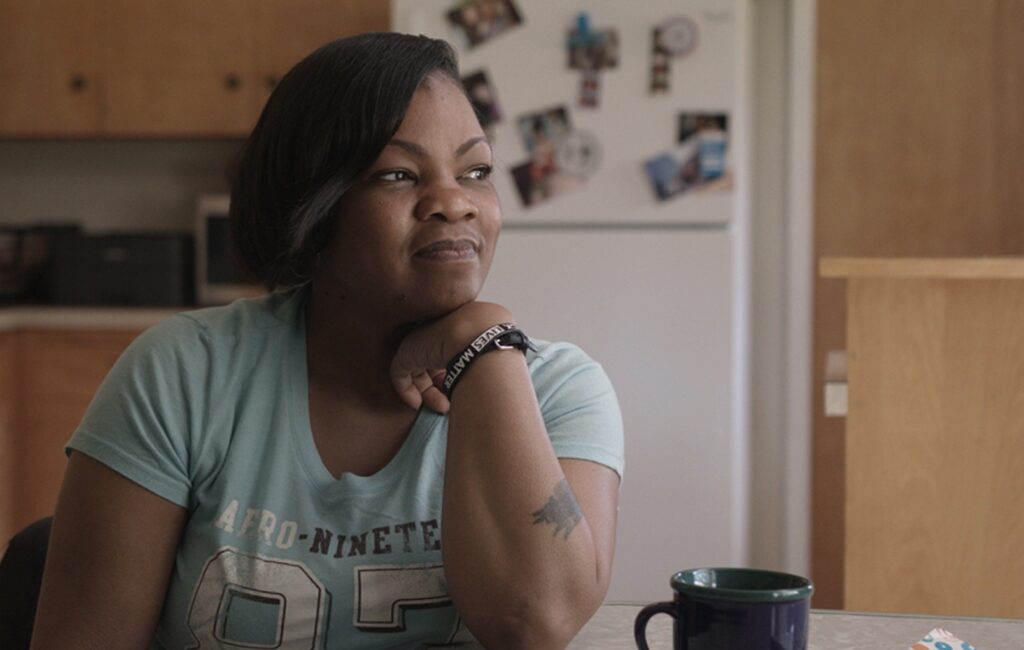Gilda Sheppard is an award-winning filmmaker who has screened her documentaries throughout the U.S. and internationally. Sheppard is a 2017 Hedgebrook Fellow for documentary film and a 2019 recipient of an Artist Trust Fellowship. Her documentaries include stories of resilience of Liberian women and children refugees in Ghana; stories of three generations of Black families in an urban neighborhood; and a film ethnography of stories from folklore started by Zora Neale Hurston in Alabama’s AfricaTown. For over a decade Sheppard has taught sociology classes in Washington State prisons and serves as co-founder and faculty for Freedom Education Project Puget Sound (FEPPS), an organization offering college credited courses at Washington Correctional Center for Women. She is a member of the faculty at The Evergreen State College Tacoma Campus.
“Since I Been Down” launches on VOD May 24.
W&H: Describe the film for us in your own words.
GS: Using archival footage, visual metaphors, first-person interviews, dance, and masquerade, “Since I Been Down” tells the dramatic story of how, in America’s backyard, a community held captive by racist policies targeting gangs and drugs sacrifices their youth for a false sense of safety and prosperity.
Nearly 40 years later, the true path to freedom now is led from inside their prison walls. This is a story told in the voices of those who are living it.
W&H: What drew you to this story?
GS: When I completed filming my documentary “Women Together as One” in the Buduburam Liberian refugee camp in Ghana, a woman in the camp said, “You know, sis Gilda, the same AK-47 in child soldiers’ hands in the Liberian civil war are in your children’s hands; you need to do something about that.” Looking around in my home state of Washington, particularly the city of Tacoma, I became acutely aware of the impact of punitive polices — three strikes, hard time for armed crime, no parole — on all our children, and particularly poor Black and Brown children.
I made “Since I Been Down” because I am worried about our children, and am acutely concerned with how the culture of punishment impacts their lives.
The journey to completing “Since I Been Down” took 12 years. This length of time brought proximity to the storytellers, enhancing access, production quality, and trust and an intimacy of building shared community. I was honored to receive their home media, oral stories, analyses, and philosophies, and to bear witness to their inspiration, regrets, and hope. I embraced that witnessing in “Since I Been Down.”
W&H: What do you want people to think about after they watch the film?
GS: How we treat our children, our culture of punishment, tells us who we are as a society and is embedded in our policies. I set out to interrogate what bell hooks asked: “For me, forgiveness and compassion are always linked: how do we hold people accountable for wrongdoing and yet at the same time remain in touch with their humanity enough to believe in their capacity to be transformed?”
W&H: What was the biggest challenge in making the film?
GS: Time, funding, and access. It is highly complex getting access inside prison.
W&H: How did you get your film funded? Share some insights into how you got the film made.
GS: Our primary source of funding was Family Foundations. As part of fundraising, I would bring folks who appear in the film to pitch discussions for authenticity.
W&H: What inspired you to become a filmmaker?
GS: My love of storytelling as transformative, and as a medium that we all have in common yet [react to] in such a wide variety of ways. It’s fascinating.
W&H: What’s the best and worst advice you’ve received?
GS: I was once told, “You are afraid of success. That is the reason it is taking you so long.” Also: “Hurry up and complete this!”
While time is important, I remember a colleague in Cuba who said to me, “We go slow because we are in a hurry.” That’s me.
W&H: What advice do you have for other women directors?
GS: Listen.
W&H: Name your favorite woman-directed film and why.
GS: I am inspired by Kathleen Collins, director of “Losing Ground,” and what she says about directing. Also, Euzhan Palcy’s “Sugar Cane Alley,” “A Dry White Season,” etc., and the films of Shirley Clarke.
W&H: How are you adjusting to life during the COVID-19 pandemic? Are you keeping creative, and if so, how?
GS: As an artist, we have no choice but to make the most out of this situation by leaning into how to bring audiences to our films through digital access, including film festivals and community screenings. What we have found is that leveraging digital screenings allows us to reach larger and broader audiences. In fact, “Since I Been Down” has had over 135 screenings across the country.
W&H: The film industry has a long history of underrepresenting people of color onscreen and behind the scenes and reinforcing — and creating — negative stereotypes. What actions do you think need to be taken to make it more inclusive?
GS: Make the films you want to see.







